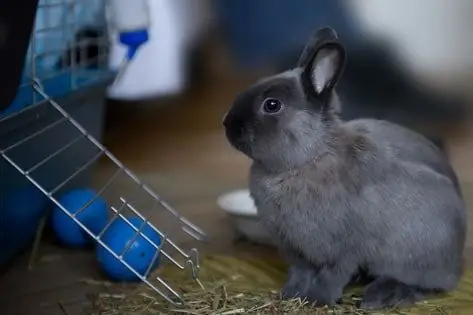
- Auteur Daisy Haig haig@petsoundness.com.
- Public 2023-12-17 03:08.
- Dernière modifié 2025-01-24 12:36.
Lorsque vous achetez un chiot, vous achetez un « certificat de santé » pour l'accompagner. Comme tout consommateur à l'esprit littéral, vous supposez qu'un certificat portant ce titre signifie qu'elle a été examinée par un vétérinaire et qu'elle a reçu un tampon d'approbation du service de santé.
Devine encore.
La semaine dernière, j'ai envoyé une rafale de courriels de ma liste de diffusion FVMA (Florida Veterinary Medical Association). Le sujet était la confusion professionnelle généralisée sur les OCVI (Certificat officiel d'inspection vétérinaire pour la vente intra-étatique d'un chien ou d'un chat). L'OCVI, un formulaire qui porte le nom commun de «certificat de santé», est l'un de ces documents que la plupart des États exigent qu'il soit rempli par un vétérinaire agréé avant qu'un animal puisse être vendu ou transporté à travers les frontières de l'État.
the point of this document? to ensure animals are vaccinated and free of parasites or other infectious diseases before sale, not (contrary to popular opinion, including mine before last week) to certify the animal’s complete health.
(at least that’s how it stands in the great state of florida, given the confusion that reigns over what these documents actually mean and how ocvis are to be filled out.)
i wasn’t sure i believed this. after all, it has always seemed to me that the purpose of this form was to ensure that unscrupulous breeders and pet shops couldn’t pass on clearly defective “merchandise.” even if you could care less about animal health and welfare, it makes sense that a health certificate should certify health at the time the animal is examined-in the interest of consumer protection, at the very least.
the emails on this thread proved otherwise. indeed, several veterinarians spoke out against the ocvi as a proof of health, referencing the need to avoid legal liability in the event that a purchased pet prove chronically ill or congenitally flawed.
silly me, i thought that was the point. since we get paid to sign these documents i figured the financial remuneration was in exchange for our expertise-that is, beyond pushing a few shots, checking for kennel cough and expertly scooping stool from a rectum for analysis.
wrong!
confused, i researched this issue. and here’s what i found:
apparently, the problem of “health certification” and veterinarian resistance to the issue stems from a drive to make vets liable for congenital illnesses that manifest up to a year after purchase when they sign ocvis.
example: a pup that was normal when a vet examined him at 8 weeks. six months later he’s diagnosed with hip dysplasia. and guess what? according to this proposed interpretation of ocvis the vet is potentially liable for his treatment.
given the choice between a document that makes me liable for what i can attest to and one that requires a crystal ball for the kind of accuracy i’m willing to sign my name to, i guess i’ll elect the former any day of the week. can’t blame my fvma colleagues on that score.
but why the either/or? why can’t i simply be liable for all the problems any reasonable vet should have seen at the time the exam?
honking heart murmurs, undescended testicles, certain obvious knee and hip diseases…
don’t these congenital niceties deserve to be included among the “health” issues we need to vet as vets?
i see pet shop pups and other shipped pets with two day-old ocvis bearing obvious congenital illnesses any third-year vet student could diagnose. clearly that’s wrong. someone needs to be accountable when these conditions are given a pass. but legally, all’s fair and square if a health certificate only deals in infectious diseases. after all, most states also have pet lemon laws making it “easy” to return a defective afflicted animal within a certain period of time. no harm no foul, right?
wrong again. no animal should be sold without a veterinarian’s stamp of approval within ten days of the sale. and that should mean that the animal appears to be completely healthy at the time of the exam. any congenital abnormalities should be written on the form. anything less means no sale. no way.
responsible breeders wouldn’t dream of doing otherwise. pet shops, on the other hand, exploit all the angles. they work with vets who know the loopholes as well as they do. they even try to get prospective owners to sign lemon law waivers, passing them off easily in the pile of paperwork that attends the point of sale.
as it stands, what you consider a health certificate for that puppy in the window may mean nothing except that said pup was vaccinated, no upper respiratory symptoms were noted and that no parasites were observed on the day the pup was presented to the vet for examination. but if vets are liable for only those meager, easily refutable functions, what does that say about the entire “health certification” process?
as my former ignorance of the law clearly implies, not all vets even know what they’re signing when they complete these forms. but you can bet the ones who work for the pet shops do.
check your state’s regulations to determine what your health certificates mean. even if you’ll never purchase a pet in your lifetime, your moral compass should drive you to care about what happens to thousands of animals every day in your state/province/country.
no-health health certificates? they simply ensure that poor quality purveyors of congenitally flawed animal flesh can continue to breed animals irresponsibly, unfairly and cruelly. and that’s gotta change.
Conseillé:
La Politique D'Amtrak Sur Les Animaux De Compagnie Permet Désormais Aux Petits Animaux De Compagnie De Voyager Sur Toutes Les Routes Du Midwest

La politique d'Amtrak sur les animaux permet désormais aux animaux pesant jusqu'à 20 livres de voyager sur toutes les routes du Midwest
Titan De L'industrie Des Animaux De Compagnie En Ligne Entre Sur Le Marché De La Pharmacie Pour Animaux De Compagnie En Proposant Des Médicaments Sur Ordonnance Pour Animaux De Com

Découvrez quel détaillant d'animaux en ligne offre désormais aux parents d'animaux de compagnie la possibilité de commander les médicaments de leur animal via leur pharmacie en ligne
L'UE Interdit La Vente De Tous Les Produits Cosmétiques Testés Sur Les Animaux

Après des années d'essais, l'UE a finalement mis en vigueur lundi une interdiction complète de la vente de produits cosmétiques issus de l'expérimentation animale
Les Aliments Pour Animaux De Compagnie Sans OGM Sont-ils Plus Sûrs Que Les Aliments Pour Animaux De Compagnie Ordinaires ?

Les organismes génétiquement modifiés, ou OGM, sont de plus en plus présents dans notre alimentation humaine et animale. Qu'est-ce que cela signifie pour votre animal de compagnie?
Les Animaux De Compagnie En Voyage Ont Souvent Besoin De Certificats De Santé

Saviez-vous que si vous traversez une frontière avec votre animal de compagnie, vous êtes censé avoir avec vous un certificat d'inspection vétérinaire à jour ? C'est vrai. Souvenez-vous de la dernière fois que vous avez rendu visite à tante Mable dans l'Ohio ou fait une randonnée en Virginie. Vous enfreigniez la loi si vous emmeniez Fluffy ou Fido avec vous sans certificat de santé
